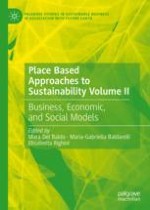2024 | OriginalPaper | Chapter
7. A Synergy of Spirituality and Technologies Toward a Society 5.0
Authors : Andrea Paesano, Mario Risso
Published in: Place Based Approaches to Sustainability Volume II
Publisher: Springer Nature Switzerland
Activate our intelligent search to find suitable subject content or patents.
Select sections of text to find matching patents with Artificial Intelligence. powered by
Select sections of text to find additional relevant content using AI-assisted search. powered by
